|
Ever struggle with attempting to find God in your daily life? Do you ever feel that you are just so busy that engaging in a personal relationship with the Lord seems out of the question? Do you struggle in attempting to recognize how God is acting in your life, at work, or in the classroom? I promise, you are not alone. Many of us struggle with finding God not only in the ordinary, but also in our busy lives. Different saints, such as St. Francis de Sales, even recognized how at times it can be challenging to find God’s presence in the ordinary. Surprising right?! Sometimes, it seems so difficult to find God in the mundane or in the office. Yet, this is exactly where we can find God’s presence—in the ordinary!
St. Francis De Sales, a Doctor of the Church and inspiration of the ever popular Salesian Spirituality, wrote in his famed Introduction to the Devout Life that “It is an error, or rather a heresy, to wish to banish the devout life from the regiment of soldiers, the mechanic’s shop, the court of princes, or the home of married people… Wherever we may be, we can and should aspire to a perfect life.” St. Francis De Sales advocates the notion that everyone is called to be in relationship with God no matter their specific state in life. For St. Francis De Sales, the soldier, the mechanic, the government officials, and the married couple—any lay person—can find God in the ordinary. God meets each of us were we are; his presence is not restricted to a building. Nevertheless, what are some practical ways in which we can find God in the ordinary? Again, St. Francis de Sales has more wisdom for us from his Introduction to the Devout Life, writing that “occasions do not often present themselves for the exercise of fortitude, magnanimity, and great generosity, but meekness, temperance, integrity, and humility are virtues that must mark all our actions in life.” When we refrain from boasting about our accomplishments in the office or when we refrain from lying to our professor regarding a string of absences from class, we are encountering God in the ordinary. When we simply take a minute in the beginning of the morning and offer our day to God, we are encountering God in the ordinary. When we take a moment to recognize a coworker’s kindness to a stranger or a fellow student’s concern for a student falling behind in class, we are encountering God in the ordinary. Encountering God is not solely done on in the pews or on the mountaintop. Instead, we can encounter God in the ordinary, in our everyday life. To learn more about seeing God in the ordinary, please visit our Prayer Resources page by clicking here. **This post was originally published on 6/3/2021**
0 Comments
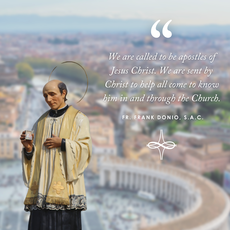 Seeking God. Seems simple. We seek God. But, more significantly, God seeks us. Similar to the lost sheep, we sometimes go astray. We want to live our call, but that can be sometimes a challenge if we try to do it on our own. God is calling us first. God is seeking us first. We are offered the grace of Christ and are called to respond. Respond to what? St. Vincent Pallotti, whose feast day is January 22nd, tells us. We are called to be apostles of Jesus Christ. We are sent by Christ to help all come to know him in and through the Church. Pallotti promoted this inspired understanding, his charism, in the mid-1830s in Rome. How do we live it in 2023 where we are? One way is by seeking God as St. Vincent Pallotti suggests: “Seek God and you will find God. Seek God in all things and you will find God in all things. Seek God always and you will always find God.” When we seek God in this way, then we will move beyond ourselves and go forth as apostles. May the charity of Christ urge us on! In God, the Infinite Love, Fr. Frank I’ve lost a lot of things in my life, and while sometimes those things eventually are found, other times I never see them again. I often put something aside for safekeeping, and then when I’m looking for it, the item is nowhere to be found. I usually just blame my ADHD, but when it’s really difficult to find something and I just cannot locate it anywhere, I do what others also may do, and I ask St. Anthony to help me find it. Ever since I was little, we were told, “Say a prayer; St. Anthony will help you find it,” and usually the item showed up soon after the search party hit full speed. So as I was preparing for this reflection, I learned a lot about who St. Anthony was, why he’s the patron saint of lost things, and how we can find what’s missing in our lives in this new year.
Anthony was born in 1195, just thirteen years after St. Francis, in Portugal. Anthony was baptized with the name Fernando, and at the age of fifteen, having lived with his wealthy family up to that point, he left home and entered religious life in order to join the order of St. Augustine. Fernando, however, had a hard time adjusting to his new life. His friends visited frequently, and his time there was anything but peaceful and studious. After only two years, he was sent away for nine years to study Augustinian theology and become a priest. Fernando didn’t remain an Augustinian, however. He requested and was given permission to join the Franciscans after witnessing Franciscan martyrs of Portugal give all they had to preaching the Gospel. He received the name Anthony and left for Morocco, but he was blown off course and landed in Sicily. While in Italy, Anthony amazed people with his sermons and preaching, because he spoke in a way that connected with the people. Anthony became a teacher and taught other friars theology, and he was known to the people for going out to larger spaces so more people could hear him preach. He wrote volumes of sermons called Sunday Sermons and Feast Day Sermons that used allegory and simplistic pictorial expression, perfect for relating to the community he served. Just before his death, Anthony left for Padua, a place that was a central player in the study of law, and he was well received there. He died at the age of thirty-six, having been a Franciscan friar for ten years. Many traditions have been associated with St. Anthony, especially in relation to his ability to help people find missing things. It is said that Anthony’s own book of psalms was stolen by a thief, but Anthony prayed to God that it would be found. The thief’s heart changed, and the psalter was returned to him, still intact with his notes for his students. Word spread of this miracle, and soon, others also began praying to God through Anthony for their missing things. Another tradition is called St. Anthony Bread. After someone’s prayer has been answered, and they’ve found their missing item, they present St. Anthony with a loaf of bread in thanksgiving for the small miracle. In many places, on the feast of St. Anthony, small loaves of bread are still blessed and given to the poor. St. Anthony of Padua has been characterized as a humble and positive man, a man of incredible penance and zeal, full of courage to preach, and considered a “man of the people.” His preaching was regarded so highly that he was made a Doctor of the Church in 1946 by Pope Pius XII. The Church particularly urges us to imitate Anthony’s “love of the word of God and his prayerful efforts to understand and apply it to the situations of everyday life”, found here. In some ways, his ability to meet his fellow apostles in their own faith journeys reminds me of St. Vincent Pallotti, a priest who was another humble saint who preached and served in the many streets of Rome. Pallotti’s life was dedicated to accompanying the faithful and helping them live out the Gospel in their everyday lives. He once said, “What God demands of you is love, gratitude, and cooperation,” and I think St. Anthony would agree with him on that. In this new year, let us put on the life of Christ as St. Anthony did. Let us share the Gospel with others simply by being a witness to the love we feel in Christ. Our message and our actions can feel lost in the hustle and bustle. We can lose ourselves in the busyness and in the daily tasks, but in 2023, let’s really take notice of what’s missing in our lives and pray that St. Anthony’s intercession can help us find anything we’ve lost. Information from this post on Anthony’s life can be found here at: https://www.stanthony.org/who-st-anthony/ Visit our Feast Day Site to find more information about Saint Anthony, too! https://www.catholicapostolatecenterfeastdays.org/feast-days-and-solemnities/st-anthony-of-padua There’s a sketch sometimes used in youth ministry that depicts a person in dialogue with God. God removes the sins of the person one by one, hammering a chisel while the person winces as those shortcomings and vices that they’d grown accustomed to are painfully removed. At one point in this sketch, the person cries out the Lord’s name in vain, and when God tells them to stop, they ask why it’s such a big deal, saying that it’s just a name, it’s a saying. God stops and says something to the effect of, “No, it's not just a name, it’s the name above all names.” We know this to be true, as St. Paul writes in his Letter to the Philippians: “God greatly exalted him and bestowed on him the name that is above every name, that at the name of Jesus every knee should bend, of those in heaven and on earth and under the earth, and every tongue confess that Jesus Christ is Lord, to the glory of God the Father.” (Phil 2:9-11) And we know of the power in the name of Jesus. Ask an exorcist what makes the demons scream in terror, and the name of Jesus will be at the top of any list. Anyone who has been in a moment of distress, terror, or need can likely think back to calling out the name of Jesus, whether with a great shout or a whisper that only they and the Lord could hear. There is great power in the name of Jesus, and on January third, the Catholic Church celebrates the feast of the Holy Name of Jesus. We are invited to reflect upon this Scripture as we ponder the power of the Holy Name of Jesus. Catholics are used to acts of reverence, whether they know them as such or not. The acts of bowing and genuflecting are second nature for most Catholics and are themselves acts of reverence. Historically, it was customary to genuflect to royalty as a sign of reverence. Catholics genuflect as a sign of reverence to Jesus himself in the Eucharist, the King of Kings who is Lord over all our lives. The General Instruction of the Roman Missal (GIRM) states, “A bow signifies reverence and honor shown to the persons themselves or to the signs that represent them,” and therefore we bow to the altar, to reverence Jesus’ act of sacrifice. A lesser-known, yet beautiful practice is the bowing of one’s head “when the three Divine Persons are named together and at the names of Jesus, of the Blessed Virgin Mary, and of the saint in whose honor Mass is being celebrated” (GIRM, 275). It was Pope Gregory X who, with St. Paul’s words to the Philippians in mind and recognizing the practical difficulty of genuflecting at the name of Jesus, introduced the practice of bowing one’s head at the name of Jesus “in token that interiorly he bends the knee of his heart” (printed in With God: A Book of Prayers and Reflections by Francis Xavier Lasance). Bowing your head at the name of Jesus, especially during the Mass, is a great way to reverence the name of Jesus; we just have to make sure that the act is not a hollow one and is an act that originates in a heart that is seeking God always. On top of reflecting with Philippians 2:9-11 and taking on the practice of bowing our heads at the name of Jesus, I’d like to offer one final way we can ponder the name of Jesus and its power in our lives. If you ever find yourself in Rome, you can walk into the Chiesa del Gesu, the mother church of the Society of Jesus, where you’ll be met with beautiful Baroque art and architecture. Possibly the greatest piece of art in this magnificent church is on the ceiling, The Triumph of the Name of Jesus, created by Giovanni Battista Gaulli and finished in 1679. This Baroque masterpiece is a fantastic example of the period, with masterful play on light and dark and the use of shadow. The art flows off onto the gold gilding, giving the impression that the art is exploding out of the space that was supposed to contain it. In the middle of this painting, surrounded by the angels and saints, is what looks to be a eucharistic host with the letters IHS beaming with magnificent light. I could stare at this painting for hours; there’s a massive mirror on the floor of the church right underneath it so that pilgrims and visitors can look at it without hurting their necks, and I’d like to invite you to do the same. You don’t have to go to Rome; you can look up the work online. Spend some time with this beautiful painting, and ask yourself how it helps you to understand the power of the Most Holy Name of Jesus. May this feast be a time to become more intimately acquainted with the name of Jesus, the name of our Lord, Savior, friend, and brother.
This is such a rich time for us as Catholic Christians! Within the past month, we’ve begun a new liturgical year, celebrated in praise and thanksgiving the Nativity of our Lord, the Holy Family, and the Blessed Virgin Mary, and we continue to celebrate as we approach the Epiphany of our Lord. It is quite difficult to wrap our hearts and minds around the richness that has been available to us over these past four weeks in the midst of the hustle and bustle of the holiday season. Among the chaos of planning and celebrating, we have also rung in a new calendar year. 2017— with its successes, failures, struggles and triumphs—has come to a close and we stand at the precipice of 2018. We all know what that means: New Year’s resolutions. Are you hoping for more control over your health, finances, or career? Perhaps you are hoping to find more time to pray and manage stress in your life. What is it that you are hoping to gain control of this year or to do more regularly? As we prepare to choose and implement changes that we would like to make in our lives, let us not forget that we are still in the midst of celebrating the Word made flesh, Emmanuel. The change and possibility of a baby, born in a humble manger, is reflected in the beginning of a new year. Is our gaze still fixed on the babe in swaddling clothes? What would 2018 bring if instead of resolving to gain control of our lives, we truly allowed the Messiah to be Emmanuel, God with us. Jesus is waiting for each and every one of us to echo the “yes” that was uttered by the Holy Family as they welcomed Him into their lives. What if instead of resolving to control everything, we resolved to say yes to that tiny baby born of a Virgin? During one of the Advent homilies at our parish, our pastor challenged us to think about times we have attempted to be the messiah of our own lives by trying to grasp or control various situations or circumstances. During this time of change and resolution, it can be tempting for us to forget that we are not the Messiah as we make plans and goals for the upcoming year. As I reflect on this, I am reminded of the words of the hymn “These Alone Are Enough” by David Schutte, based on the Suscipe prayer of St. Ignatius of Loyola: “Take my heart oh Lord. Take my hopes and dreams. Take my mind with all its plans and schemes. Give me nothing more than your love and grace. These alone, oh God, are enough for me.” It is good and just to strive to improve our character and to foster good and healthy habits in our lives. However, instead of resolving to do it on our own, by the gift of that blessed Christmas morning, we have the choice to freely give all of these things over to the One who makes all things new. As you stand at the threshold of this New Year and envision your hopes and dreams for 2018, take a moment to reflect on what these possibilities could become if you allowed them to be infused by the abundant grace of God. It is still the Christmas season. There is still time to approach the manger. Take the leap of faith. Instead of resolving to gain control, approach the manger and resolve to say YES and to be transformed! Resolve to offer the babe in swaddling clothes your mind, your heart, your body, and soul. As you boldly step out into 2018, my prayer for you echoes the words of Saint Paul, “May the God of peace make you perfectly holy and may you entirely, spirit, soul, and body, be preserved blameless for the coming of our Lord Jesus Christ. The one who calls you is faithful, and he will also accomplish it.” Question for Reflection: What are some resolutions you can hand over to the Lord this New Year? **This post was originally published on 1/2/2018** |
Details
Archives
July 2024
Categories
All
|
About |
Media |
© COPYRIGHT 2024 | ALL RIGHTS RESERVED



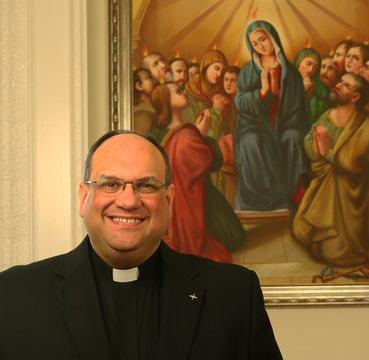
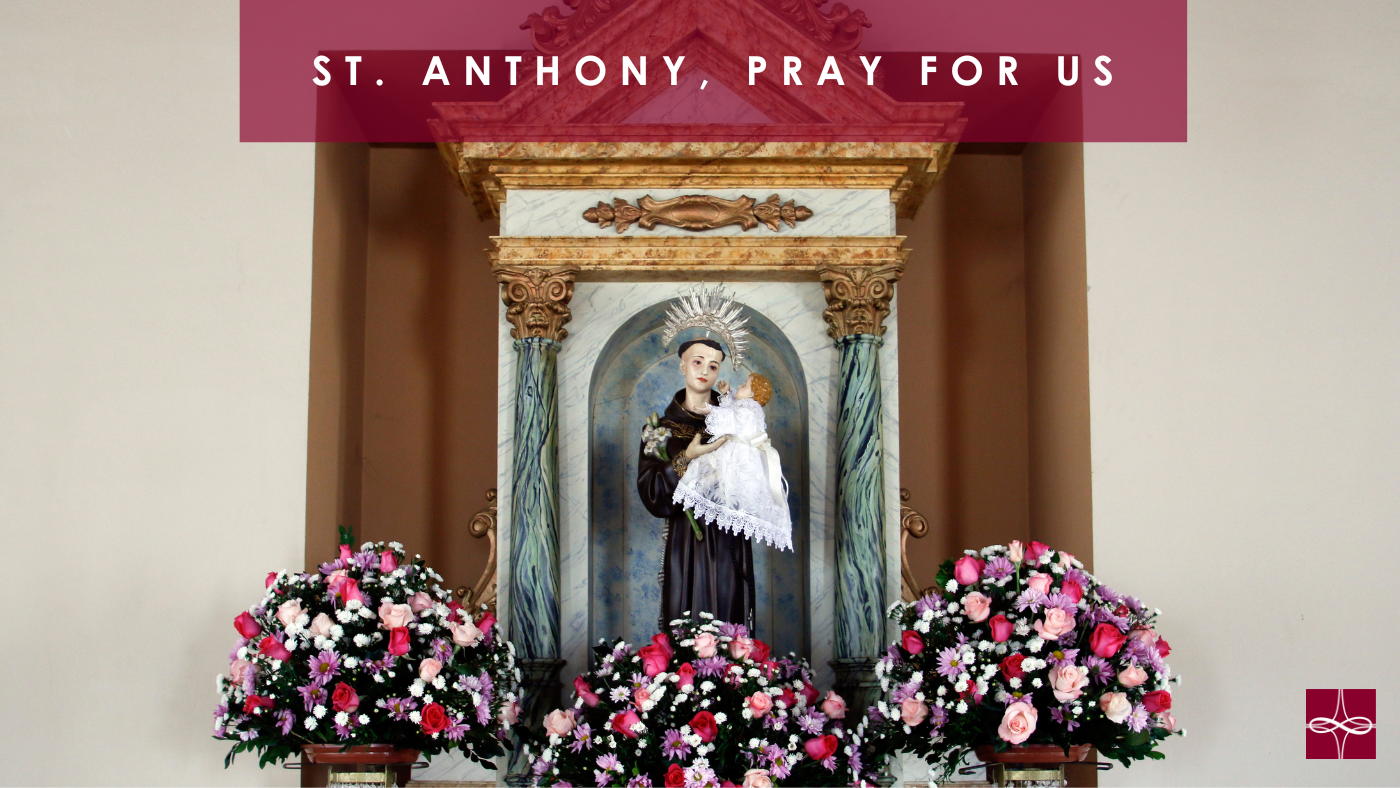

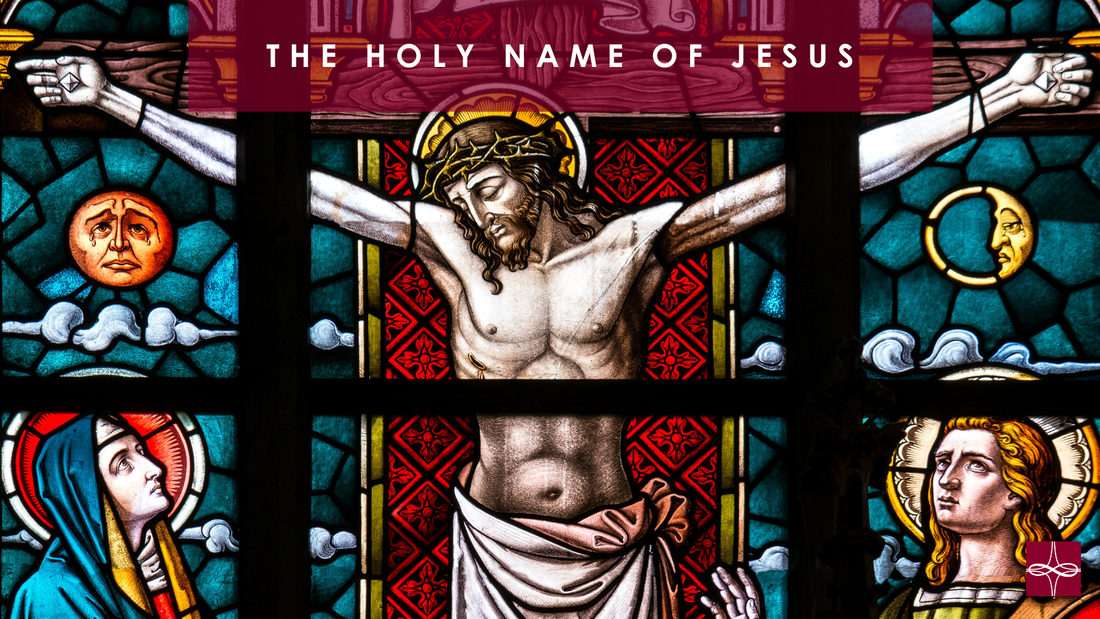
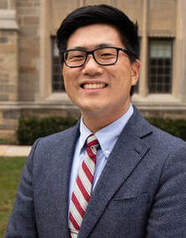


 RSS Feed
RSS Feed